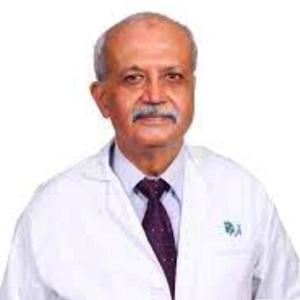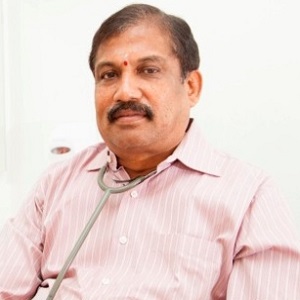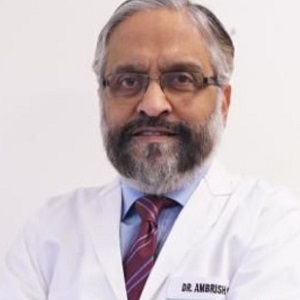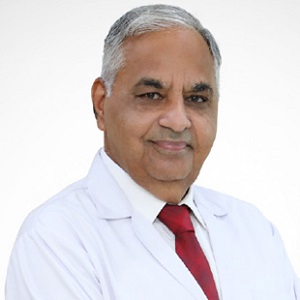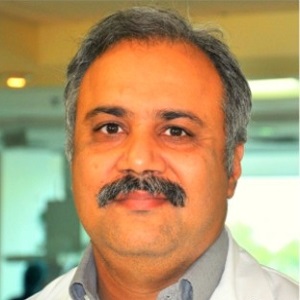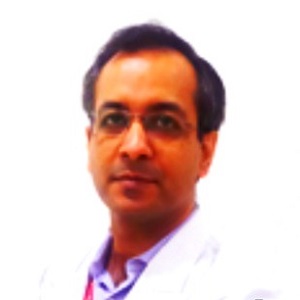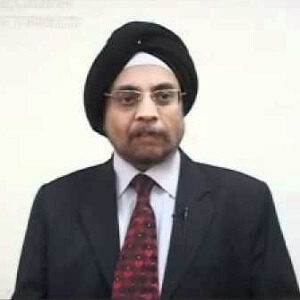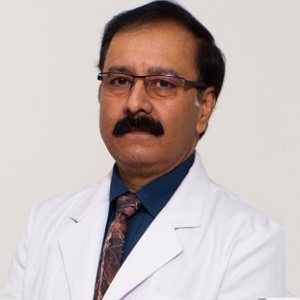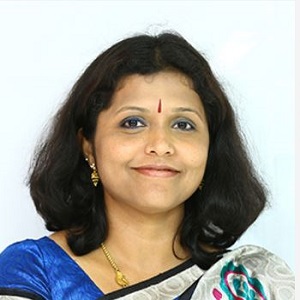Best Doctors in India for Hyperparathyroidism Treatment
- Endocrinologist, Diabetologist, New Delhi, India
- Over 26 years’ experience
Profile Highlights:
- Dr. Mohammada Asim Siddiqui is one of the best endocrinologists in India. He has an experience of over 26 years in the field. Dr. Siddiqui is active as a senior consultant – endocrinologist with Apollo Centre for Obesity, Diabetes, & Endocrinology, New Delhi.
- Dr. Siddiqui specializes in Internal Medicine & manages Diabetes, Endocrine and Metabolic Disorders, skin allergies, and Piles Treatment.
- His interest in Diabetes mainly focuses on young and gestational diabetes & Post-transplant & post-metabolic surgery diabetes.
- Dr. Siddiqui is also involved in various clinical research and has penned more than 50 articles in national and international journals.
- Endocrinologist and Diabetologist, New Delhi, India
- Over 40 years’ experience
Profile Highlights:
- Dr. C M Batra is currently associated as a Senior Consultant with the Department of Endocrinology at Indraprastha Apollo Hospitals, New Delhi
- He specializes in Diabetic, Thyroid, Obesity, Reproductive Disorder, Bone and Metabolism
- Dr. Batra is a member of RSSDI, Endocrine Society of India, and the American Endocrine Society
- Endocrinologist & Diabetologist, Chennai, India
- Over 43 years’ experience
Profile Highlights:
- Dr. Rajendiran N holds an experience of more than 4 decades and expertise in diabetic consulting for chronic patients.
- Dr. Rajendiran specializes in Gestational Diabetes, Type 1 Diabetes and Type 2 Diabetes.
- He is the secretary of the Diabetes Association of India (Southern Chapter) and Founder President of Madras Medical College Diabetes Alumni Association.
- Endocrinologist & Diabetologist, New Delhi, India
- Over 38 years’ experience
Profile Highlights:
- Dr. Ambrish Mithal is an endocrinologist, who in 2019, has been nominated to the Governing Council of the National Health Authority, the apex body involved in implementing the ambitious population health coverage plan of the government.
- Dr. Mithal was awarded the Dr. B C Roy Award by the President of India for his contribution to the development of endocrinology in India.
- Endocrinologist & Diabetologist, New Delhi, India
- Over 33 years’ experience
Profile Highlights:
- Dr. Ashok Kumar Jhingan has been treating chronic diabetes patients and has an experience of 33 years in this arena.
- He completed MBBS from Maulana Azad Medical College in 1974, FICA from All India Institute of Medical Sciences, New Delhi in 1975, and MD – General Medicine from All India Institute of Medical Sciences, New Delhi in 1997.
- Dr. Jhingan is known for rendering health education for the prevention and treatment of Diabetes Education
- Endocrinologist, Gurugram, India
- Over 20 years’ experience
Profile Highlights:
- Dr. Dheeraj Kapoor is a well-known Endocrinologist in New Delhi who has expertise in treating diabetes-related complications.
- After completing his MBBS & Masters in Medicine, he did his DM Endocrinology from the Institute of Medical Sciences, Banaras Hindu University, Varanasi
- Dr. Dheeraj Kapoor is an active member of various renowned organizations such as the Association of Physicians of India, the Endocrine Society of India, and Research Society for the Study of Diabetes in India, and the Indian Thyroid Society.
- Endocrinologist & Diabetologist, Gurugram, India
- Over 26 years’ experience
Profile Highlights:
- Dr. Manish Gutch is a well-trained Endocrinologist with specializations in Diabetes & Metabolism, Osteoporosis, Menopause, and Hormonal Disorders.
- He is presently working at Medanta Hospital as the director of the Endocrinology department.
- Dr. Manish Gutch’s high intellectual capacity is reflected through his outstanding achievement of three Gold medals during the successful completion of MBBS, MD, and DM.
- Pediatric Endocrinologist, Diabetologist, New Delhi, India
- Over 36 Years Experience
Profile Highlights:
- Dr. I.P.S. Kochar is one of the best Pediatric Endocrinologists in India, having over 36 years of experience. He is a senior consultant for Pediatric Endocrinology at the Indraprastha Apollo Hospital, New Delhi.
- Dr. Kochar is specialized in the treatment of Growth disorders, metabolic disease, Dyslipidemia, Thyroid Disorders, Osteoporosis, Jaundice, and other Endocrinology problems in children and adolescents. One can also consult Dr. Kochar for weight & height and diabetes management.
- He published numerous writing for many national and international journals.
- Endocrinologist & Diabetologist, Gurugram, India
- Over 35 years’ experience
Profile Highlights:
- Dr. Atul Luthra is a senior consultant in the arena of diabetes and other endocrine disorders.
- He is an excellent teacher and author. He is widely known for delivering guest lectures at various state and national level conferences.
- Dr. Luthra is a prolific speaker and orator, who has a special contribution to diabetes outreach in India.
- Endocrinologist & Diabetologist, Chennai, India
- Over 14 years’ experience
Profile Highlights:
- Dr. Sruti Chandrasekaran is an American board-certified endocrinologist and diabetologist practicing at the Dr. Rela Institute in Chennai as a senior consultant who treats innumerable diabetic patients.
- Ever since she moved back from the University of Maryland she has been heading the endocrine department and managing various endocrine inpatients and outpatients.
Best Hospitals in India for Hyperparathyroidism Treatment
Indraprastha Apollo Hospital, New Delhi
- City: New Delhi, India
Hospital Highlights:
- Indraprastha Apollo Hospital is a 700-bedded multispecialty hospital in the heart of the capital of India. It is a part of Apollo Hospital group, one of India’s most reputed healthcare chains. Indraprastha Apollo Hospital has been accredited by Joint Commission International, making it the first internationally accredited hospital in the country in 2005.
- There are 52 specialties in the hospital with one of the best cardiology centers in the country. The hospital is also equipped with State of the art infrastructure facilities with the largest Sleep Lab in Asia and the largest number of ICU bed facilities in India.
- The hospital also has one of the largest dialysis units in India along with a dedicated Bone Marrow Transplant unit.
- The latest and highly advanced technologies that are installed in the hospital include Da Vinci Robotic Surgery System, PET-MR, PET-CT, Cobalt-based HDR Brachytherapy, Brain Lab Navigation System, Tilting MRI, Portable CT scanner, 3 Tesla MRI, 128 Slice CT scanner, DSA Lab, Endosonography, Hyperbaric Chamber and Fibro scan.
Fortis Memorial Research Institute, Gurugram
- City: Gurugram, India
Hospital Highlights:
- Fortis Memorial Research Institute is a multi-super-specialty, quaternary care hospital with 1000 beds. The hospital comprises reputed clinicians, and international faculty and is also equipped with cutting-edge technology. The hospital is a part of Fortis Healthcare Limited, a reputed chain of private hospitals in India.
- It is a NABH-accredited hospital that is spread across 11 acres of land and has a capacity of 1000 beds. The hospital has 55 specialties and is one of the premier health care centers in the Asia Pacific region popularly known as “the Mecca of Healthcare”.
- The hospital has 260 diagnostic centers and is also equipped with the latest and advanced techniques that include 3 Telsa which is the world’s first Digital MRI technology. The hospital also has world-class Radiation Therapy techniques which have been developed by leading technology experts from Elekta and Brain Lab.
Apollo Hospital, Chennai
- City: Chennai, India
Hospital Highlights:
- Apollo Hospitals, Chennai, is one of the best hospitals for heart care in India. Over the years, Apollo has expanded all over India, as a healthcare chain.
- India’s first ‘Only Pancreas’ transplant was performed in Apollo Hospital. The hospital is known for successfully performing Asia’s first en-bloc combined heart and liver transplant, and over the years, it has attained a remarkable achievement in the global healthcare space. Around 3-4 organ transplants are performed in the hospital per day.
- Equipped with over 500 beds, this hospital in Chennai was established in 1983 and since then has been among the most preferred hospital for patients from all over the world.
- The hospital holds accreditation of the NABH and JCI and is the first hospital in India to be ISO 9001 and ISO 14001 certified. It is also the first South Indian Hospital to receive subsequent reaccreditation from the JCI USA 4 times.
Medanta-The Medicity, Gurgaon
- City: Gurugram, India
Hospital Highlights:
- One of India’s best and largest multi-specialty hospitals, Medanta was built with the aim to bring India to the highest standards of medical care. The hospital has been providing the best medical services to its patients, since its inception, with care, commitment, and compassion.
- Equipped with 1250 beds, the hospital was founded by Dr. Naresh Trehan in the year 2009 with an aim to provide the best medical care at affordable costs. The hospital is spread across 43 acres and includes 45 operation theatres and 350 beds dedicated solely to ICU. The hospital includes over 800 doctors, and more than 22 specialty departments and has a dedicated floor for individual specialty in order to offer the best services under one roof.
- The hospital is considered one of the premier institutes in India for Cardiac Care and includes staffs and members of high caliber. The hospital has 6 distinct centers of excellence.
Max Super Specialty Hospital, New Delhi
- City: New Delhi, India
Hospital Highlights:
- One of the well-regarded providers in India committed to the highest standards of clinical excellence and patient care, Max Super Specialty Hospital is a part of Max Healthcare, which is the second-largest healthcare chain in India. Regarded as one of the most well-regarded healthcare providers in the country, Max Super Specialty Hospital is committed to the highest standards of clinical excellence as well as patient care. The hospital is also equipped with the latest technology as well as cutting-edge research. The hospital is known to deliver and ensure the highest level of patient care.
- The hospital has more than 500 beds and offers treatment for over 35 specialties. The hospital also holds the credit of having installed the first Brain Suite in Asia. This is a highly advanced Neurosurgical machine that allows MRI to be taken while surgery is ongoing.
- Other advanced and latest technologies are also installed in the hospital such as the 1.5 Tesla MRI machine, 64 Slice CT Angiography, 4D ECHO, LINAC, and 3.5T MRI machine.
Artemis Hospital, Gurugram
- City: Gurugram, India
Hospital Highlights:
- One of the most well-known hospitals in the Delhi NCR, Artemis Hospital is the first hospital in Gurugram to get accredited by the Joint Commission International.
- With more than 40 specialties, the hospital has been designed to be one of the most technically advanced hospitals in the country, with the best medical and surgical health care. The hospital has eleven special and dedicated centers, for Heart, Cancer, Neurosciences, etc.
- The latest technologies in the hospital include Endovascular Hybrid Operating Suite and Flat panel Cath Labs for the cardiovascular department, 3 Tesla MRI, 16 slice PET CT, 64 Slice Cardiac CT Scan, HDR Brachytherapy, and highly advanced Image Guided Radiation Therapy techniques (LINAC) are installed in the hospital.
- The hospital has won several awards as well, since its inception.
BLK Max Super Specialty Hospital, New Delhi
- City: New Delhi, India
Hospital Highlights:
- Equipped with 650 beds, BLK Superspecialty Hospital is the largest stand-alone private sector hospital in Delhi.
- With over 1500 healthcare providers and 150 globally renowned super specialists, the hospital is one of Asia’s largest Bone Marrow Transplant Centres. The hospital is known for having some of the best cancer doctors in the country.
- The hospital is NABH and NABL accredited and was inaugurated by the first Prime Minister of India. Pt. Jawahar Lal Nehru.
Gleneagles Global Hospitals, Chennai
- City: Chennai, India
Hospital Highlights:
- Established in 1999, Gleneagles Global Hospital, Chennai, is one of the top healthcare facilities in Southern India. It is part of the Gleneagles Hospital Chain, which is the fourth largest healthcare chain in the country. The hospital specializes in multi-organ transplants of kidneys, liver, lungs, heart, etc.
- The hospital has an excellent infrastructure and state-of-the-art lab and equipment set-up. The hospital boasts cutting-edge technologies, a highly skilled team of doctors and surgeons, and trained support staff. Located in Perumbakam, Chennai, it is one of India’s premier health care destinations. The hospital has performed some of the most complex surgical and clinical procedures in India including multi-organ transplantations.
- The hospital’s lung transplantation program is one of the best in the country. The hospital is known for having performed India’s first single lung transplant and first minimal invasive lung transplant. It is also the only Indian hospital to be associated with King’s College Hospital, London, United Kingdom for liver transplantations.
Fortis Hospital, Mulund, Mumbai
- City: Mumbai, India
Hospital Highlights:
- Fortis Hospital in Mulund is a 315-bed multi-speciality tertiary care hospital with five JCI accreditations that offers a wide variety of diagnostic and therapeutic services. The Fortis Hospital in Mulund delivers patient-centred treatment with cutting-edge technology, highly skilled and experienced surgeons, and paramedical staff.
- This institution houses Maharashtra’s largest multi-organ transplant centre. It is also the first heart transplant centre in western India to conduct 100 or more consecutive heart transplants in under four years. It is the only hospital in the city to have multi-organ transplants and has handled the youngest patient for angioplasty. Fortis Hospital Mulund now boasts the first advanced surgical robot in central Mumbai.
- Cardiology and heart surgery, urology, nephrology, neurosciences, orthopaedics, digestive care, emergency and critical care, and maternity care are among the services provided by the hospital.
Kokilaben Dhirubhai Ambani Hospital, Mumbai
- City: Mumbai, India
Hospital Highlights:
- Kokilaben Dhirubhai Ambani Hospital, Named after the wife of Indian industrialist Dhirubhai Ambani, the founder of Reliance Industries, this is one of the top hospitals in Mumbai. This 750-bed multi-specialty hospital became operational in 2009. Known as one of India’s most advanced tertiary care facilities, the hospital is designed to raise India’s global standing as a healthcare hub, with an emphasis on excellence in clinical services.
- Kokilaben Dhirubhai Ambani Hospital uses Protocol and Care Pathway based treatment models to ensure the best outcomes for patients.
- The hospital represents a confluence of top-notch talent, cutting-edge technology, state-of-the-art infrastructure, and, most importantly commitment.
- The hospital also holds the accreditation of the NABH, NABL, CAP, and JCI.
- The hospital has been recognized as the No. 1 Multispecialty Hospital in Mumbai and the West Zone for the fifth year in a row in 2020 by The Week.
Hyperparathyroidism
Symptoms
Sometimes hyperparathyroidism may be diagnosed before the signs and symptoms become apparent. However, when the symptoms do occur, they are usually the result of damage or dysfunction in other organs or tissues because of calcium levels in the blood and urine or too little calcium in the bones.
In some cases, the symptoms might be mild and nonspecific so that they don’t seem related to this condition. Or in some cases, they might even be severe. The signs and symptoms can include any of the following:
- Osteoporosis
- Kidney stones
- Getting tired easily or weakness
- Depression
- Forgetfulness
- Excessive urination
- Abdominal pain
- Bone and joint pain
- Nausea, vomiting or loss of appetite
- Frequent complaints of illness without any apparent cause
If you see any signs and symptoms of hyperparathyroidism, it might be important to see a doctor. These symptoms might be caused by multiple disorders, which can include some serious complications. Therefore, a prompt accurate diagnosis is important for appropriate treatment.
Types
There are two main types of hyperparathyroidism.
In primary hyperparathyroidism, there is an enlargement of one or more of the parathyroid glands which leads to overproduction of the hormone. This can cause high calcium levels in the blood, which can lead to a variety of health problems. Surgery is usually the most common treatment for this type of hyperparathyroidism.
Secondary hyperparathyroidism generally occurs due to other ailments that initially causes low calcium levels in the body. Over time, increased parathyroid hormone levels may also occur.
Tertiary hyperparathyroidism occurs when your parathyroid glands create too much parathyroid hormones after your calcium levels return to normal. This type generally occurs among people who are suffering from kidney problems.
Causes & risk factors
Hyperthyroidism is caused when one or more of your parathyroid glands become overactive and creates an excess of parathyroid hormones. This can be caused by a tumor, enlargement of the gland, or other structural problems of the parathyroid gland.
When the calcium levels are quite low, your parathyroid glands respond by increasing their production of parathyroid hormones. This leads to your kidneys and intestines absorbing a larger amount of calcium. It also helps to remove more calcium from your bones. Parathyroid hormones return to normal when your calcium level rises up again.
The following factors may increase your risk of primary hyperparathyroidism:
You may be at an increased risk of primary hyperparathyroidism if you:
- Have had a prolonged or severe deficiency of calcium or vitamin D
- Are a woman who has gone through menopause
- Have a rare, inherited disorder like multiple endocrine neoplasia, type 1, which is known to affect multiple glands
- Have taken lithium, a drug which is mostly used for the treatment of bipolar disorder
- Have been treated with radiation therapy for cancer that has exposed your neck to radiation
Diagnosis
Blood Tests
Urine Tests
Kidney Tests
Treatment
In the following conditions, your doctor might recommend no treatment and only regular monitoring:
- The calcium levels of your body are only slightly elevated
- You are not having symptoms that require treatment
- Your kidneys are functioning normally, and you don’t have kidney stones
- Your bone density is quite normal or only slightly below normal
If you choose this watch-and-wait approach, tests to monitor your blood-calcium levels and bone density will be required periodically.
Surgery
Surgery is the common treatment, in most cases, for primary hyperparathyroidism, and in most cases, it provides a cure as well. A surgeon is only going to remove only those glands that are enlarged or the glands that have a tumor.
If all the four glands are affected, then your surgeon is likely going to remove three glands and probably a portion of the fourth. He/she will be leaving some functioning parathyroid tissue.
Surgery can also be done as an outpatient procedure, as this will allow you to go home the same day. In such cases, the surgery can also be done with the help of very small cuts i.e. incisions, in the neck, and only local anesthetics are provided.
Complications from surgery can happen, although it is uncommon. Sometimes there might be damage to the nerves that control the vocal cords. There might be low calcium levels that require the use of calcium as well as vitamin D supplements.
Complications
Complications of hyperparathyroidism are mostly related to the long-term effect of having very little calcium in your bones and excess in your bloodstream. Some of the common complications include:
- Osteoporosis – The loss of calcium can sometimes result in weak and brittle bones that can get fractured easily.
- Cardiovascular disease – Although the exact link of the cause is unclear, high calcium levels are mostly associated with cardiovascular conditions, which can include high blood pressure as well as certain types of heart disease.
- Neonatal hypoparathyroidism – Severe, untreated hyperparathyroidism in pregnant women can also sometimes lead to dangerously low levels of calcium in newborn babies
- Kidney stones – Excess calcium in your blood might lead to excess calcium in your urine, which can cause tiny and hard deposits of calcium and other substances to form in the kidneys. This can cause a kidney stone. A kidney stone can cause major pain while passing through the urinary tract.


